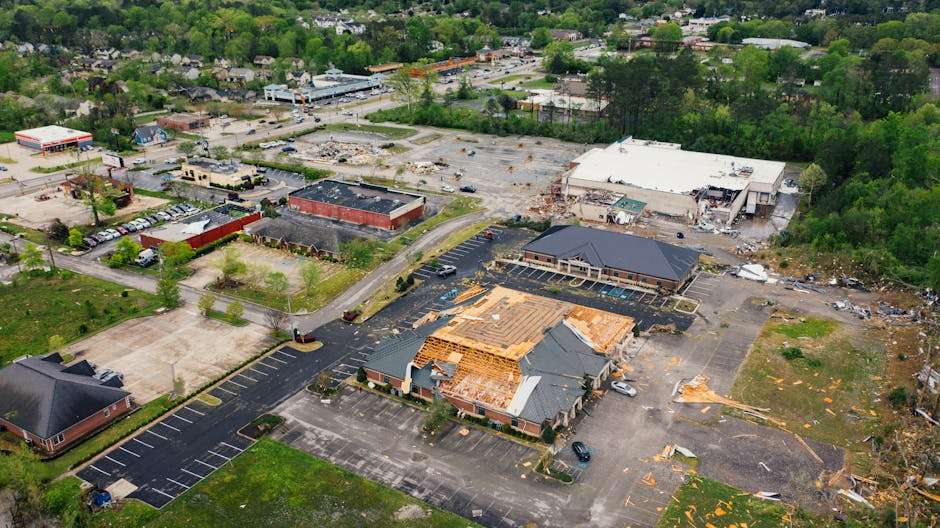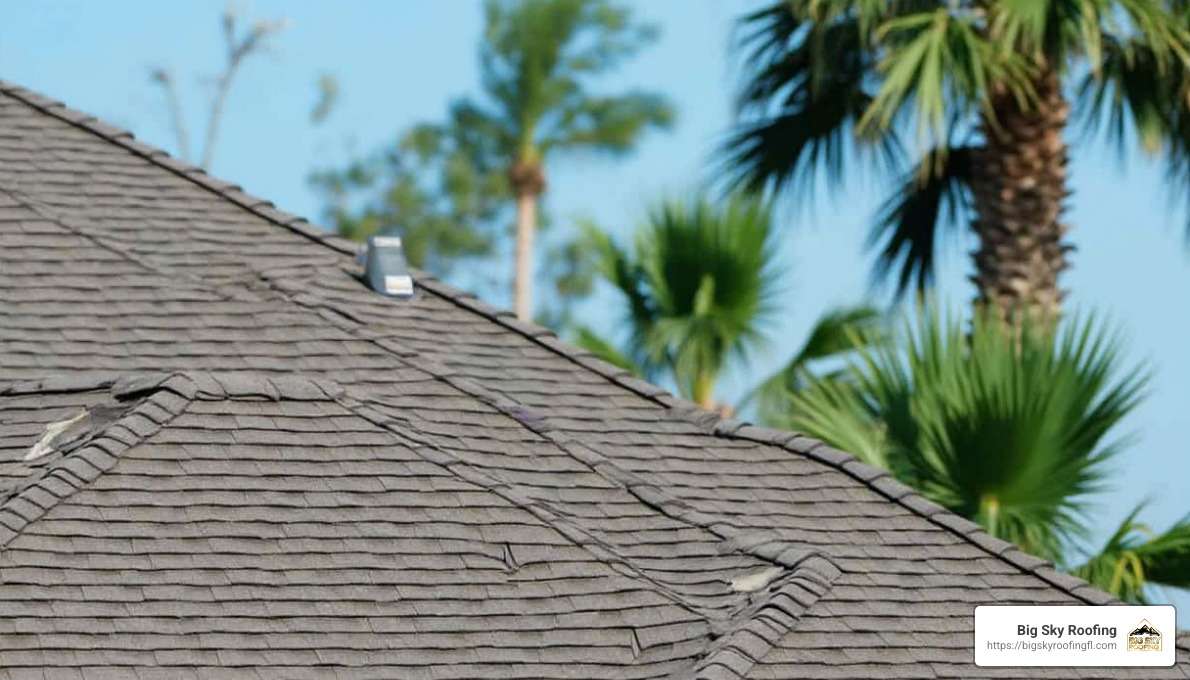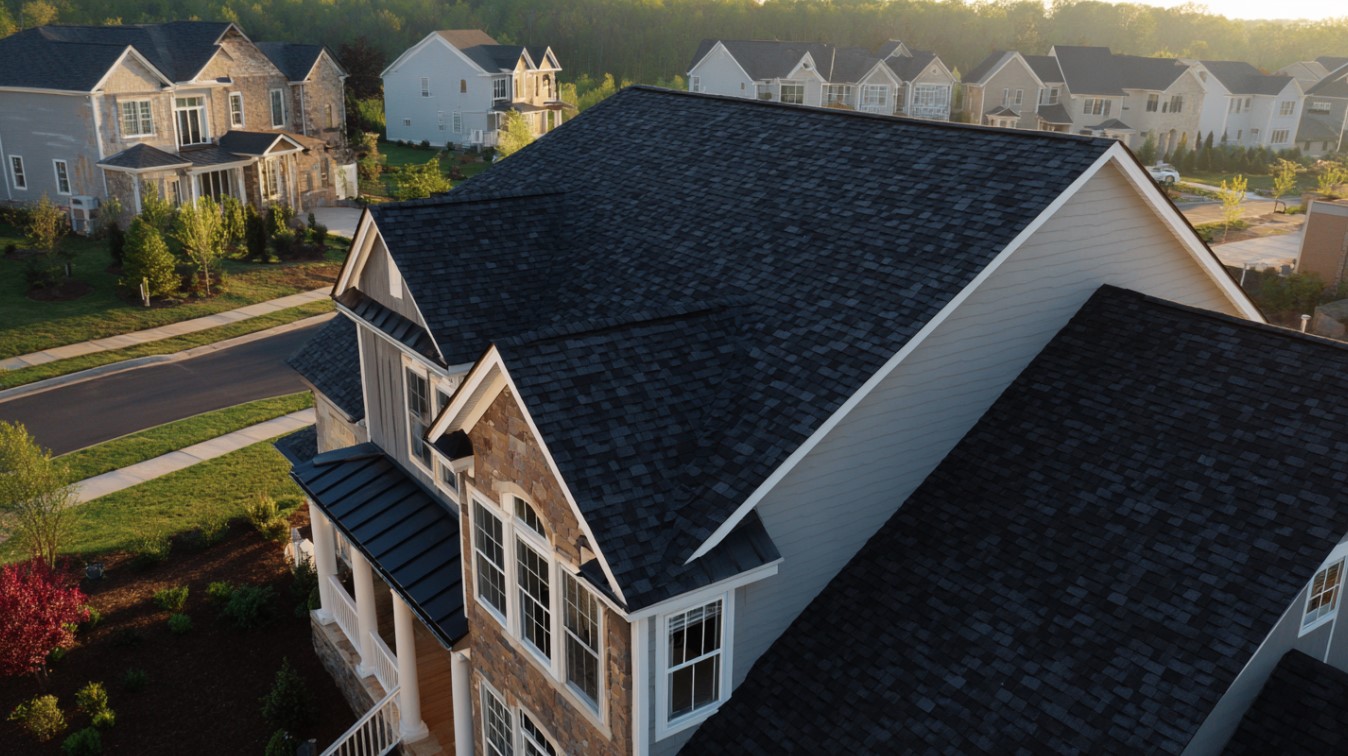Florida’s Commercial Roof Replacement: What You Need to Know
•
Written By
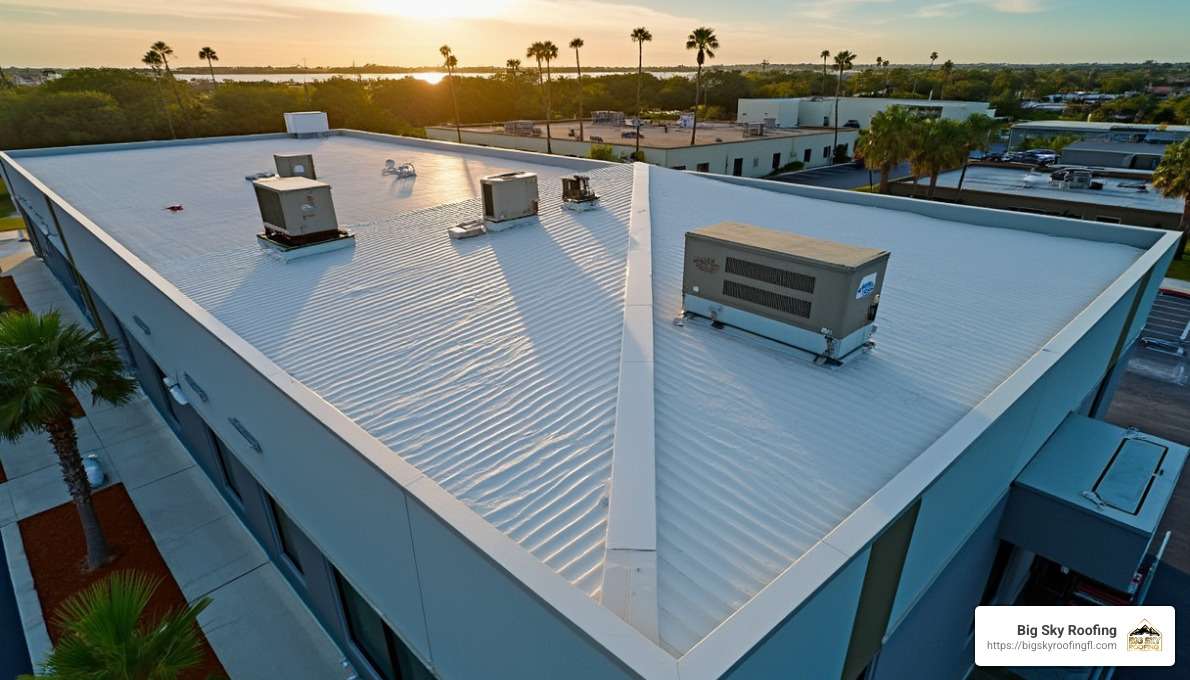
Florida commercial roof replacement is a crucial task for any business owner looking to maintain the integrity and safety of their building. To make sure you’re in compliance with the Florida Building Code and saving on costs, know when and how to get your roof replaced. Business owners need to understand the local regulations and maintenance requirements to ensure their roofs last as long as possible. Here’s a quick breakdown:
- Florida Building Code: Comply with state regulations to avoid penalties and ensure your building’s safety.
- Routine Maintenance: Prevents costly repairs and prolongs the lifespan of your roof.
- Commercial Roofing Solutions: Choose materials that best meet your building’s needs and withstand Florida’s weather challenges.
Maintaining your commercial roof is not just about meeting legal requirements, but also about protecting your investment and ensuring the safety of everyone inside your building. Regular inspections and timely maintenance can save you money in the long run and extend the life of your roof, giving you peace of mind.
Keeping up with your roof’s needs is not just a smart business decision—it’s essential.
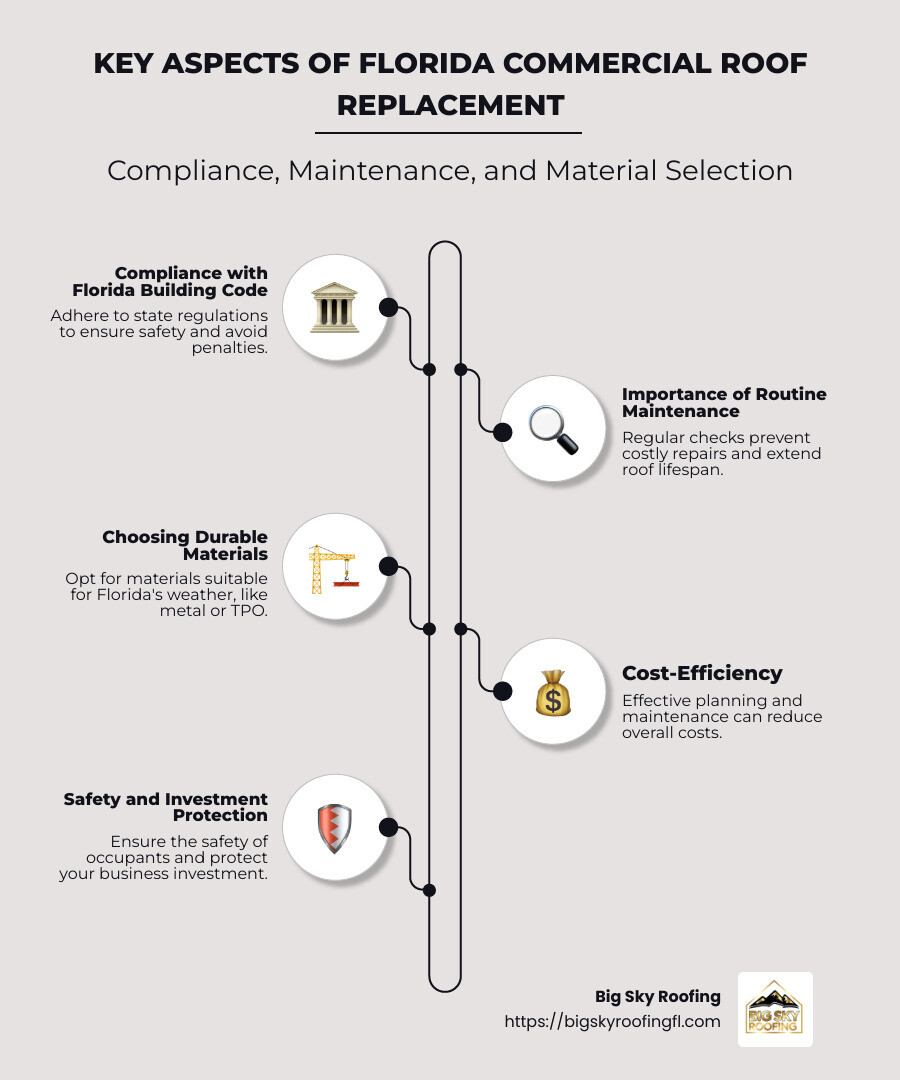
Understanding Florida’s Roofing Regulations
Navigating the Florida Building Code can be a daunting task, especially when it comes to commercial roofing. But understanding these regulations is crucial to ensure compliance and avoid unnecessary costs.
The 25% Rule
Previously, Florida’s “25% rule” required that if more than 25% of a roof needed repairs, the entire roof had to be replaced. This was a significant burden for business owners.
However, as of May 2022, there’s good news! The rule was updated. Now, if the rest of your roof complies with the 2007 Florida Building Code or later versions, you can focus only on the damaged sections. This change can save you a lot of money on materials and labor.
But remember, if your roof was built before March 1, 2009, the old rule might still apply. It’s essential to check your roof’s compliance to avoid any surprises.
Florida Building Code and SB-4D
The Florida Building Code is designed to ensure safety and durability. It includes specific requirements for roofing materials and construction practices. Staying updated with these codes is critical for any commercial building owner.
One of the significant updates is the SB-4D legislation, which focuses on building safety and structural integrity. This includes provisions for roofing that aim to improve resilience against hurricanes and other natural disasters. The SB-4D is part of Florida’s ongoing efforts to improve building standards in light of increasing extreme weather events.
For business owners in Sumter County, Lake County, Citrus County, Hernando County, Orange County, and Marion County, adhering to these regulations is not just about legal compliance. It’s about ensuring the safety of your property and everyone inside it.
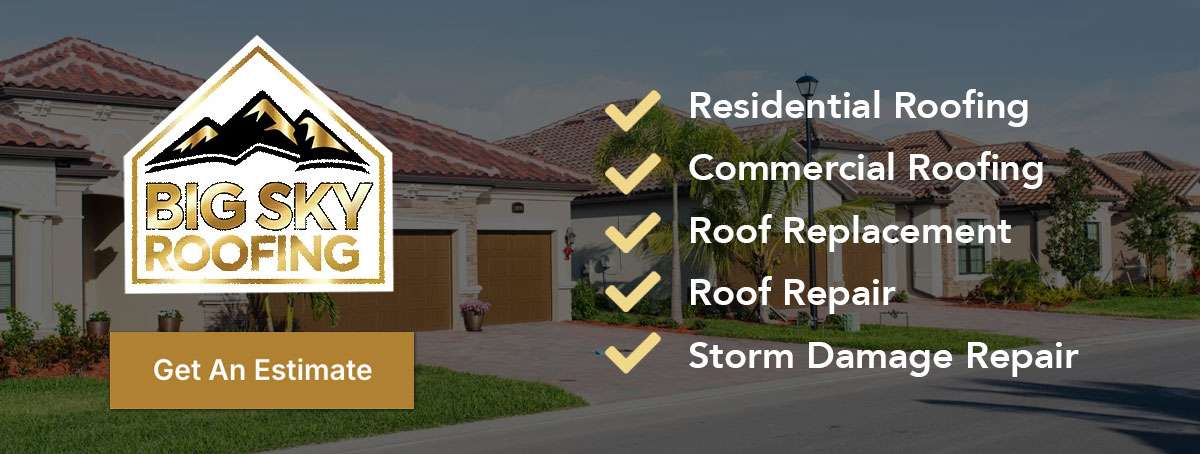
Key Takeaway: Familiarize yourself with the Florida Building Code and any updates like SB-4D. It’s not just about following the law—it’s about safeguarding your investment and the people who depend on your building.
Understanding these regulations will help you make informed decisions about your Florida commercial roof replacement needs. Up next, we’ll dive into the different types of commercial roofing materials available, so you can choose the best option for your building.
Types of Commercial Roofing Materials
Choosing the right roofing material for your commercial building in Florida is crucial. The climate demands materials that can withstand heat, humidity, and hurricanes. Here’s a breakdown of the most popular options: metal roofing, TPO roofing, and modified bitumen.
Metal Roofing
Metal roofing is a top choice for many commercial buildings in Florida due to its durability and long lifespan. It’s especially popular for buildings with sloped roofs. Some benefits include:
- Longevity: Metal roofs can last 40-70 years if maintained properly.
- Energy Efficiency: They reflect solar heat, which can reduce cooling costs.
- Durability: Resistant to fire, wind, and impact, making them ideal for hurricane-prone areas.

Metal roofing is also customizable with various colors and styles, allowing businesses to match their aesthetic preferences.
TPO Roofing
TPO (Thermoplastic Olefin) roofing is another excellent choice, particularly for flat roofs. It’s a cost-effective option that suits Florida’s climate well:
- UV Resistance: TPO roofs are designed to withstand UV rays, which helps in reducing energy costs.
- Seam Strength: TPO membranes have strong seams, providing excellent protection against leaks.
- Longevity: With proper maintenance, TPO roofs can last 20-30 years.
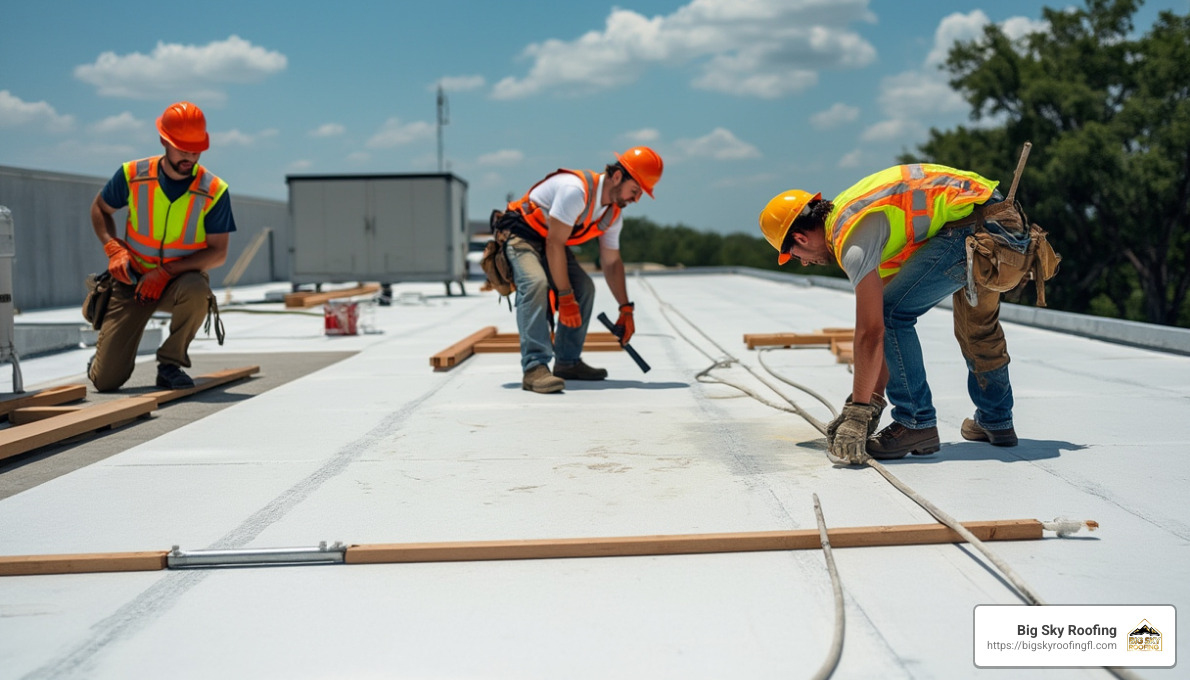
TPO roofing is also environmentally friendly, as it is fully recyclable at the end of its life cycle.
Modified Bitumen
Modified bitumen is a traditional choice for flat and low-slope roofs. It has been a staple in the roofing industry for decades:
- Waterproofing: Known for its excellent waterproofing capabilities.
- Flexibility: The material can expand and contract without losing its integrity, which is crucial in Florida’s fluctuating temperatures.
- Layered Protection: Typically consists of five layers, providing robust protection against the elements.
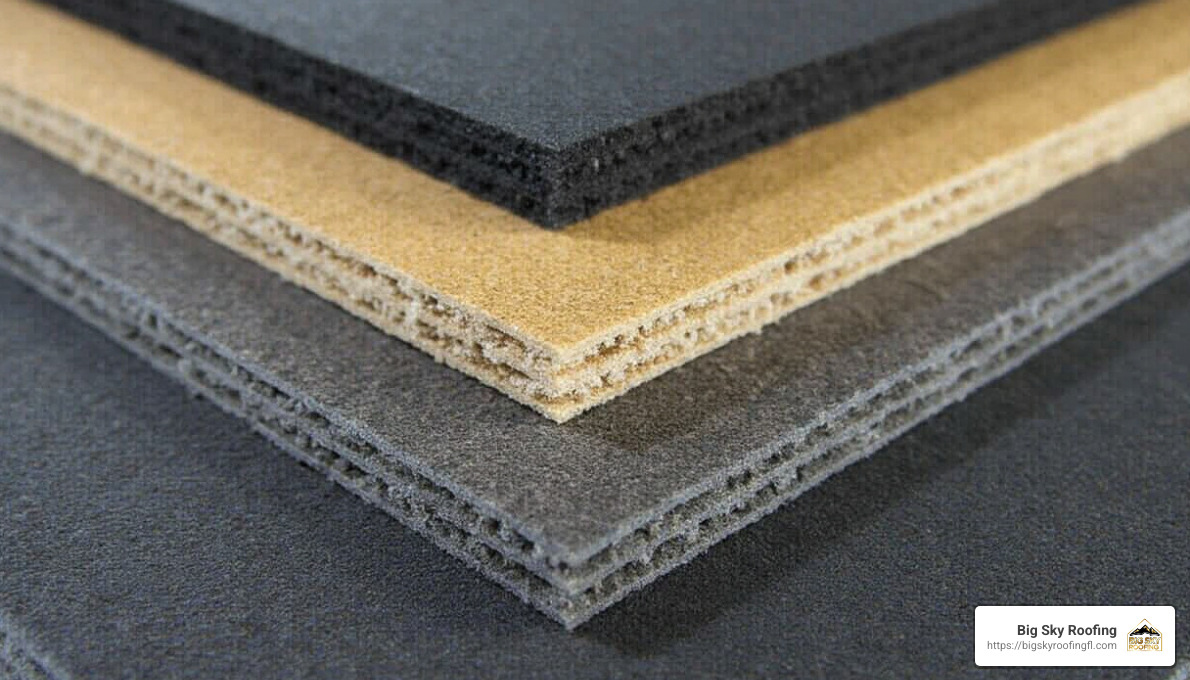
Modified bitumen is often chosen for its balance of cost and performance, offering reliable protection at a reasonable price.
When considering a Florida commercial roof replacement, it’s essential to weigh the pros and cons of each material. The right choice depends on your building’s structure, budget, and aesthetic preferences.
Next, we’ll explore the costs associated with these roofing materials and how to plan financially for a roof replacement.
Florida Commercial Roof Replacement Costs
When planning for a Florida commercial roof replacement, understanding the costs involved is crucial. The average cost can range from $11,000 to $30,000, with many projects averaging around $15,000. However, several factors can influence these costs.
Factors Affecting Cost
- Size of the Roof: Larger roofs require more materials and labor, increasing the overall cost.
- Roofing Material: Different materials have different price points. For example, metal roofing generally costs more upfront but offers longer-term savings due to its durability and energy efficiency.
- Roof Complexity: Roofs with multiple slopes, angles, or intricate designs can increase labor costs due to the complexity of the installation.
- Location: Costs can vary by county. In primary service areas like Sumter County, Lake County, Citrus County, Hernando County, Orange County, and Marion County, local regulations and labor rates can impact the final price.
- Permits and Compliance: Adhering to local building codes, such as the updated 25% rule, might affect costs if significant repairs are needed.
Financial Planning
Proper financial planning is essential to manage these costs effectively:
- Budgeting: Set aside funds annually for roof maintenance and eventual replacement. This can help avoid financial strain when major repairs or replacements become necessary.
- Insurance: Ensure that your insurance policy covers roof damage and replacement. Review the policy terms to understand your coverage and any potential out-of-pocket expenses.
- Financing Options: Consider financing options or loans specifically for commercial improvements. These can help spread the cost over time, making it more manageable.
- Get Multiple Quotes: Obtain quotes from several licensed roofing contractors. This can help you understand the market rate and choose the best option for your needs.
Planning ahead and understanding the factors that affect roofing costs can help you make informed decisions and ensure your budget aligns with your roofing needs.
Next, we’ll discuss the importance of regular roof maintenance and how it can save you money in the long run.
Importance of Regular Roof Maintenance
Regular maintenance of your commercial roof is not just a good idea—it’s essential. It can prevent small issues from becoming costly problems, keep your building safe, and save money in the long run. Let’s explore why maintaining your roof is so crucial.
Preventive Measures
Think of roof maintenance like a regular health check-up. By catching problems early, you can avoid bigger issues down the road. Here are some key preventive measures:
- Regular Inspections: Schedule professional inspections at least once a year. This helps to identify and address issues like leaks, cracks, or damaged shingles before they worsen.
- Debris Removal: Keep your roof clean by removing leaves, branches, and other debris. This prevents water from pooling and causing damage.
- Gutter Cleaning: Ensure gutters are clean and free-flowing. Clogged gutters can lead to water overflow, damaging your roof and building structure.
Safety
A well-maintained roof is a safe roof. Regular maintenance reduces the risk of accidents or injuries caused by structural failures. It also helps in:
- Leak Prevention: By fixing leaks promptly, you protect the interior of your building from water damage, mold, and mildew.
- Structural Integrity: Ensuring your roof is in good condition keeps the entire building structurally sound, safeguarding your employees and assets.
Cost-Efficiency
Investing in regular maintenance is cost-effective. Here’s how:
- Extend Roof Lifespan: Proper care can significantly extend the life of your roof, delaying the need for a costly Florida commercial roof replacement.
- Reduce Repair Costs: Addressing minor issues early prevents them from developing into major repairs, which are often much more expensive.
- Energy Savings: A well-maintained roof can improve insulation and reflectivity, reducing energy costs by keeping your building cooler in the summer and warmer in the winter.
In summary, regular roof maintenance is a smart investment that improves safety, prolongs roof life, and saves money over time. By taking these preventive steps, you can ensure your commercial roof remains in top condition, providing peace of mind and financial savings.
Next, we’ll answer some frequently asked questions about Florida commercial roof replacement.
Frequently Asked Questions about Florida Commercial Roof Replacement
What is the 25% rule for roof replacement in Florida?
The 25% rule in Florida is a vital regulation for commercial roof replacements. Initially, it required that if more than 25% of a roof needed repair within a year, a full roof replacement was mandatory. However, as of May 2022, there’s a helpful update. If the remaining part of the roof complies with the 2007 Florida Building Code or later versions, a full replacement is no longer necessary. This change can save businesses a significant amount of money. But remember, if your roof was built before March 1, 2009, you might still need to follow the old rule.
How often should a commercial roof be replaced?
The lifespan of a commercial roof depends on the materials used. For instance, shingle roofs typically last 15-20 years, while more durable materials like metal or tile can last up to 40 years. However, in Florida, many insurance companies limit coverage for roofs older than 15 years. Regular inspections and maintenance are key to extending your roof’s life. Scheduling professional inspections at least once a year can help catch issues early and ensure compliance with current codes.
Do roofers need to be licensed in Florida?
Yes, roofing contractors in Florida must be licensed. This requirement ensures that they meet the state’s standards for safety and quality. Working with a licensed roofer is crucial because it provides legal protection and guarantees that the contractor is insured. This means you’re covered in case of any accidents or damages during the roofing project. Always verify the contractor’s license and insurance status before hiring them to ensure you’re working with a qualified professional.
By understanding these key aspects of Florida commercial roof replacement, you can make informed decisions about your roofing needs, ensuring compliance and extending the life of your investment.
Conclusion
At Big Sky Roofing, we take pride in delivering superior craftsmanship and exceptional customer service across Central Florida. With over 25 years of experience, we’ve built a reputation for reliability and quality in every project we undertake.
Our team understands that a roof is more than just a covering—it’s a critical component that protects your business and its assets. That’s why we ensure every roof replacement is executed with precision, using only the highest quality materials that can withstand Florida’s challenging weather conditions.
Choosing Big Sky Roofing means working with a licensed and insured team dedicated to meeting your needs. We provide free estimates, ensuring transparency and honesty in our pricing. Plus, our focus on customer satisfaction means we’re always ready to address your concerns and tailor our services to fit your specific requirements.
Whether you’re in Sumter County, Lake County, Citrus County, Hernando County, Orange County, or Marion County, we’re here to support your commercial roofing needs. Our commitment to excellence ensures that your investment is protected for years to come.
For more information on how we can assist with your Florida commercial roof replacement, visit our service page. Let us help you safeguard your business with a roof built to last!

